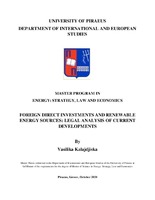Foreign direct investments and renewable energy sources: legal analysis of current developments

Προβολή/
Λέξεις κλειδιά
Foreign direct investments ; Energy Charter Treaty (ECT) ; Renewable energyΠερίληψη
The subject of this master thesis are the “Foreign direct investments and renewable energy sources: legal analysis of current developments”. The topic is focused on the effects brought by incentivizing long-term investments in the energy sector and the possible ‘scenarios’ that could follow as an outcome.
In the introduction, the aim is to describe how the renewable energy sector usually depends on large, upfront investments, which take long period of time until the invested amount is returned. Given the substantial initial capital investment required, many countries (particularly those in the European Union) have enacted schemes, such as feed-in tariffs or other special rates, to encourage long-term investment. Investors in the renewable energy sector have a strong interest in the stability of this regulatory regime and every investor strongly values the continuity of any incentive schemes for renewable energy over the period of expected recovery. The paper also closely observes the impact and the meaning of protection from unwarranted government policy changes that could amount to expropriation or even to a denial of fair and equitable treatment.
An important milestone and the key to assurance of the future investors is the Energy Charter Treaty (ECT), originally concluded in the aftermath of the Cold War, with a purpose to integrate the former Soviet Union's resource-rich energy sectors into the European market. The role of the Treaty is briefly discussed as the ECT provides an international legal framework for energy cooperation, particularly in Europe. Since the past decade saw a significantly increased level of investment, including foreign investment as a result of international initiatives on the development of alternative energy sources, a significant number of countries have implemented government subsidies and support schemes to encourage investment in renewable energy. These measures were designed to encourage renewable resources usage and to gradually decrease the continued use of fossil fuels. The fact that companies are deciding to invest in RES definitely has a positive impact and surely is in line with the global measures and efforts to fight the global warming and the climate change, but this also has negative effects. As the number of RES investments arises, the number of disputes under the ECT arises as well and the thesis analyses several relevant cases against EU countries. Before concluding, the paper focuses on the changing role of the ECT derived from the recently arisen disputes and how this could impact the future of RES investments. The author finishes strong, by describing the bigger picture and gives her own input regarding the future of the topic.


